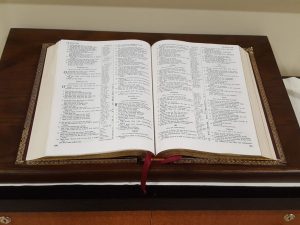Do Manners Matter Anymore?
We have become a nation of rude people. Does that matter? I actually think it does because there is a link between manners and morals.
As a grandfather of three little children, it’s so important to teach them to engage in good manners, to be grateful. I even write thank you notes to local places we visit, such as our unique South Florida butterfly attraction or a local farm tour, and have them each write something on the thank you card.
Manners do matter, and I’ll explain why in a moment.
In our documentary for Providence Forum, “The Beginning of Wisdom”—which is all about the extraordinary role the Bible played in early American education—the narrator says, “In the early 1960s (and earlier, going back to colonial times), schools opened in prayer.”
Then Judge Darrell White, the founder and director or Retired Judges of America, notes, “In 1962, there was a case called, Engel v. Vitale, that came out of New York Board of Regents prayer that was a very tepid prayer, asking God’s blessing on ourselves, our parents, our teachers, and our country, amen, and that was struck down by the United States Supreme Court, they nullified that prayer. And in the following year devotional reading of the Bible in a case called, Abington v. Shempp, that was nullified as well.”
Next on the documentary comes Dennis Prager of PragerU: “The Supreme Court changed America more with the 1962 decision that prayer in school was unconstitutional. That was the decision that began the end of America as we knew it. It’s as universal a prayer and non-denominational as you could have. And as I often point out, within one generation, kids went from blessing their teachers to cursing their teachers.”
Do manners matter? One of the great aspects of George Washington was his adherence to Biblical-type principles in a book he studied thoroughly, The Rules of Civility.
Meanwhile if would be fair to say that politics has virtually always had an uncivil tone. Frankly, today’s politics (generally) can be viewed as relatively tame.
In 1856, anti-slavery Senator Charles Sumner of Massachusetts was nearly beaten to death by a pro-slavery Congressman from South Carolina. This took place in the U.S. Capitol.
I believe there really is a link between manners and morals. William Wilberforce, the great 18th-19th century Christian statesman, who spent his lifetime championing the cause of abolishing the slave trade and slavery in the British Empire as a longtime Member of Parliament, was also engaged in a lesser-known crusade.
He and other reformers in pre-Victorian England pushed for what they called “the reformation of manners.” The modern translation of that would be “the reformation of morals.”
In short, manners and morals are related. But they are not the same. A person can have great manners and be morally corrupt. The Eddie Haskell character on Leave it to Beaver provides a classic humorous example of that.
However, if you remove manners from society, we are left with a crasser and cruder world. Outward good manners are generally a reflection of inside decency and kindness, and reflect the Christian concept of putting others ahead of self.
We know we’re supposed to love our neighbor as ourselves. At just about every wedding, they read the love chapter from Paul’s letter to the Corinthians. Included in that chapter is: “Love is…not rude.”
Employing basic good manners also applies the golden rule of Christ. It’s treating others as we would want to be treated.
Schools today often have serious problems with discipline. At a more basic level, good manners are gone. In some cases, the schools are even unsafe.
My daughter taught English as a second language in rural Thailand for a semester several years ago. She marveled at how polite and well-behaved the students were. As she would walk into each class, a student volunteer would shout out, “Stand up, class!” They all stood up for the teacher. Then they would cheerfully say in unison, “Good morning, teacher!” They would not sit down until she let them. Needless to say, there was no need for metal detectors in those schools.
In his book, The Tipping Point, Malcolm Gladwell writes of the “Broken Windows theory,” postulated by James Q. Wilson and George Kelling: “If a window is broken and left unrepaired, people walking by will conclude that no one cares and no one is in charge. Soon, more windows will be broken, and the sense of anarchy will spread from the building to the street on which it faces, sending a signal that anything goes” (p. 141).
Rudeness and boorish behavior send a signal that anything goes. Bad manners can signal a breakdown in civilized behavior. All the while, the test of good manners is to put up with bad ones.
Yes, sir, manners matter.
###
Jerry Newcombe, D.Min., is the executive director of the Providence Forum, an outreach of D. James Kennedy Ministries, where Jerry also serves as senior producer and an on-air contributor. He has written/co-written 33 books, including George Washington’s Sacred Fire (with Providence Forum founder Peter Lillback, Ph.D.) and What If Jesus Had Never Been Born? (with D. James Kennedy, Ph.D.).
Editors’ Note: Ron Kirk of Nordskog Publishing is the author of “Thy Will Be Done.” He wrote the following insightful email (2/28/24) responding to the above article:




